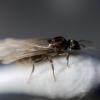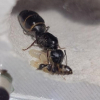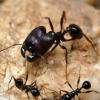- Formiculture.com
- Forums
- Gallery
- Members
- Member Map
- Chat

5 replies to this topic
#1
 Offline
-
Posted August 15 2021 - 5:14 PM
Offline
-
Posted August 15 2021 - 5:14 PM
Hey guys, I'm not new to ant keeping but I used to live in Belgium where most of my ants were kept in Yton nests which I build. Last year I moved to Japan and I finally managed to convince my wife to keep ants again. (She's not a big insect fan)
However, I can't seem to find grout or Yton, or hydrostone ... and the only popular ant keeper here in Japan, Ant base Tokyo, makes all his nests out of plaster.
I've read that plaster formicariums only last 6 months or so before mold starts to grow. However I read that some people add charcoal powder to make it mold less.
Anybody has any experience with plaster nests and how to keep them mold free for longer periods of time?
However, I can't seem to find grout or Yton, or hydrostone ... and the only popular ant keeper here in Japan, Ant base Tokyo, makes all his nests out of plaster.
I've read that plaster formicariums only last 6 months or so before mold starts to grow. However I read that some people add charcoal powder to make it mold less.
Anybody has any experience with plaster nests and how to keep them mold free for longer periods of time?
#2
 Offline
-
Posted August 15 2021 - 5:17 PM
Offline
-
Posted August 15 2021 - 5:17 PM
You might want to keep a species that prefers drier conditions so you don’t have to hydrate the nest as often. It might last longer that way. I don’t have any personal experience with plaster nests, though.
#3
 Offline
-
Posted August 15 2021 - 6:15 PM
Offline
-
Posted August 15 2021 - 6:15 PM
I haven't tried this but maybe getting springtails could work?
- ANTdrew and zA-Z0-9 like this
#4
 Offline
-
Posted August 15 2021 - 6:26 PM
Offline
-
Posted August 15 2021 - 6:26 PM
You might want to keep a species that prefers drier conditions so you don’t have to hydrate the nest as often. It might last longer that way. I don’t have any personal experience with plaster nests, though.
A lot of ants here are big humidity lovers, so that might be challenging 😅
I haven't tried this but maybe getting springtails could work?
Sounds like something that could possibly work. Anybody experience with this?
#5
 Offline
-
Posted August 16 2021 - 2:18 AM
Offline
-
Posted August 16 2021 - 2:18 AM
I think the right kind of springtail could totally work. Search for ones that live in association with ants in the wild.
"The ants are a people not strong, yet they prepare their meat in the summer." Prov. 30:25
Keep ordinary ants in extraordinary ways.
Keep ordinary ants in extraordinary ways.
#6
 Offline
-
Posted August 16 2021 - 7:48 AM
Offline
-
Posted August 16 2021 - 7:48 AM
Plaster of paris does not mold after a specific certain time period, although ants usually burrow out of a nest in 6 months to a year, depending on species and wall thickness. As long as you don't add anything to the plaster material that might give mold a foothold (cork, some paints, other organic materials), your nest can last as for as long as the ants stay contained. I've had many a colony thrive in plaster long term, and the nest will only mold if food (usually a protein source) is brought into contact with the plaster. Just try not to allow your ants to bring large chunks of food into the nest.
If you do use plaster, hydration is more of an issue then mold in my experience. Use distilled water, as some other types of water have minerals added for taste and such. These minerals, and even chemicals, can break down the plaster quicker then exposure to water naturally does already. I have had the best success with Tar Heel Ant style water reservoirs, although sponge hydration can sometimes work as well.
Leave the Road, take the Trails - Pythagoras
Utah Ant Keeping --- Here
DIY Formicariums and Outworlds --- Here
Honeypot Ant Journal --- Here
Photo Album --- Here
Videos --- Here
Also tagged with one or more of these keywords: question
Ant Keeping →
General Ant Keeping →
L.Niger test tube is too wetStarted by Mr.Fish , Jun 9 2024 |
|

|
||
Ant Keeping →
General Ant Keeping →
Camponotus Japonicus advice neededStarted by Holuden , Jun 7 2024 |
|

|
||
Ant Keeping →
General Ant Keeping →
My ants keep moving to the outworld?Started by Pokee5954 , Feb 18 2024 |
|

|
||
Ants & Myrmecology →
General →
Is it too early to consider another colony?Started by Pokee5954 , Dec 1 2023 |
|

|
||
Termites →
Termite Keeping →
I don't know exactly how to start a termite colonyStarted by Bugging3out , May 1 2022 |
|

|
0 user(s) are reading this topic
0 members, 0 guests, 0 anonymous users

















